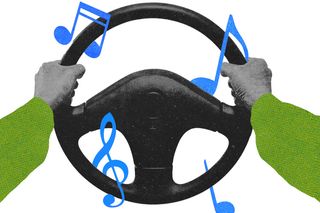
How Music May Make People Less Cautious While Driving, Working
“[T]he presence of music — vs. silence — affected performance… It led participants to make faster and also less accurate decisions.”

Cars with music playing at full volumes are a fairly common sight on the streets. Yet, I find it hard to recall stopping to wonder whether the driver is so distracted by the music as to pose any immediate danger to people around them — that’s how ubiquitous the practice is; it barely raises eyebrows. Turns out, though, the practice may indeed pose danger.
According to a new study published in the Journalof Experimental Psychology: General, listening to music can make people less cautious. The researchers asked the study participants to perform a variety of tasks to check the impact of background music on their ability to perceive their surroundings, categorize letters, make decisions based on their preferences, and access general knowledge. The result: diminished performance across the tasks.
The science here points out how people may be slow to pick on auditory cues while listening to music. Driving, for instance, necessitates that the person identifies auditory information that changing sounds — such as honks — are communicating. Music, in this scenario, quickly morphs into noise and serves as a distraction. Past research, too, has come to similar conclusions. “[T]he vehicle serves as a place for social functioning where friends can be together independently of their parents, the presence of three or more peer passengers — along with loud music — is a distraction that can increase the crash-risk four-fold… ” a 2013 study noted.
The perceived safety issues that come with listening to music feel a little counterintuitive. Despite its ability to distract, listening to music while working, studying, doing household chores, or gymming, is a rather universal habit. Many, in fact, find it helpful. “[M]usic puts us in a better mood, which makes us better at studying… Being in a better mood likely means that we try that little bit harder and are willing to stick with challenging tasks,” Timothy Byron, a lecturer in psychology at the University of Wollongong in Australia, wrote in The Conversation.
He added a caveat, though, “[Music] also distracts us, which makes us worse at studying.”
Related on The Swaddle:
Is This Normal? “I Hate Music”
This caveat, however, might not be a blanket one. According to Byron, music with lyrics can adversely impact people’s performance in tasks that involve using working memory, or “holding and manipulating several bits of information in your head at once.” He says, “[W]hen there’s music in the background, and especially music with vocals, our working memory gets worse… reading comprehension decreases when people listen to music with lyrics.”
The present study, unfortunately, used only a classical, instrumental piece — The Flight of the Bumblebee by Rimsky-Korsakov — for the experiments, making it difficult to examine the impact of music with lyrics. However, past studies — from 1989 and 2014 — attest to Byron’s statement.
Byron also believes fast and loud music — “at about the speed of Shake It Off by Taylor Swift, at about the volume of a vacuum cleaner” — can reduce people’s ability to perform the tasks at hand.
The findings from the present study differ, though. Adding nuance to their experiments, the researchers studied the impact of variation in tempo — from 40 beats per minute to 190 beats per minute — on the speed and accuracy demonstrated by the participants.
They didn’t find notable differences in their impact on people’s performance. “The participants… did report feeling more physiological arousal while listening to the fast vs. slow version — but this did not translate into relatively faster responses,” the British Psychological Society noted, reporting on the study. Ultimately, “the presence of music — vs. silence — affected performance on all of the tasks. It led participants to make faster and also less accurate decisions.”
While many people may find music distracting, past research — from as early as 1997 to as recently as 2007 — indicates that it’s more distracting for introverted individuals. Byron believes it is “perhaps, because introverts are more easily overstimulated.”
Related on The Swaddle:
Why Some People Love Sad Music — And Others Don’t
However, is it the distraction that leads to a lack of caution? Or, could it be a reduction in anxiety as a result of listening to music that makes people less alert?
Commenting on the study, a Reddit user wrote, “I have anxiety and can be hyper-vigilant, so I listen to music to tone that down and focus on what’s in front of me. Otherwise, every sound I hear makes me want to check out.” Further, given that a 2013 report found music to be extremely impactful in combating stress and anxiety, it doesn’t seem entirely unlikely that the soothing effect of music may have a role to play in putting people at greater ease — perhaps, even in situations where that may not necessarily be desirable.
Nonetheless, it is important to acknowledge that the impact of music can vary from person to person. “As someone living with adult ADHD and complex PTSD… [I] need background music to maximize my executive functioning and dampen my startle response to unexpected sounds,” an individual commented on the study.
The impact of music can also depend on the kind of task one is performing. “[S]imple tasks — something done every day such as inputting data or sorting emails — typically underutilizes a person’s attentional resources or ‘mental bandwidth.’ When paired with music, the sound can enhance performance by occupying the leftover attention space, and minimize the risk of drifting off during a routine task,” an article by Rutgers University states.
Having said that, we know “seemingly innocuous and ubiquitous” music can lead people to be less cautious. But it’s important to delve deeper into why, and explore how to minimize the impact in circumstances where being alert is of paramount importance — for instance while driving on a busy road, at the intersection of a myriad of sounds.
In the meantime, the next time we’re laughed at for asking people, “Can you please pause for a moment so I can think clearly?” we’ll, at least, have research to explain why background noise is distracting.
Devrupa Rakshit is an Associate Editor at The Swaddle. She is a lawyer by education, a poet by accident, a painter by shaukh, and autistic by birth. You can find her on Instagram @devruparakshit.
Related


New Research Explains How Climate Change Can Trigger Future Pandemics
